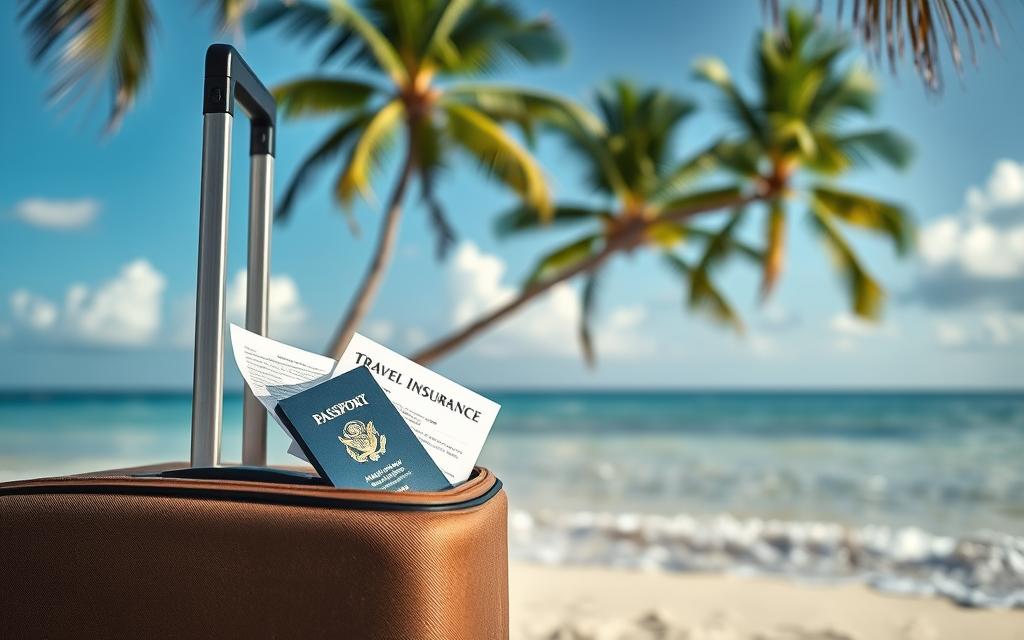Traveling is exciting and memorable, but it has its risks. Unexpected trip cancellations and medical emergencies abroad can be scary. That’s why travel insurance is important. It protects you from the unexpected and makes your trip smooth. In this guide, we’ll explore travel insurance coverage in detail. We’ll look at the different types of protection and how to pick the right policy. Whether you’re going on a vacation or a business trip, knowing about travel insurance can give you peace of mind and financial security.
This guide will help you understand how to protect your travel investments. We’ll cover trip cancellation and medical emergencies. Join us to learn how to travel with confidence.
What You Should Understand When Acquiring Travel Insurance Policies
Traveling alone can be very intimidating as many things can go wrong in such a situation of being away from home. Luckily, that is why, travel insurance exists. However, it is wise to know before-hand what the travel insurance will cover. Let’s explore a few important points of understanding it.
Cancellation Coverage and Refund Transfer: These travel insurance refund policies are important because they cover you in case of needing to cancel due to any sickness, injury or emergency within family. Knowing that you’re covered financially makes you more at ease before traveling.
Medically Related Emergencies: Also included in travel insurance and very, if medically getting sick or injured, in case, is emergency medical coverage which bacterias covering hospital stays as well as doctor’s appointments while being outside your home country. It is extremely important for international travel as it is very likely that one’s insurance cards won’t suffice.
Lost Baggage Conveyances: Damaged or lost and misplaced luggage is also protected by travel insurance, including loss, theft, and delay. Travel Insurance allows you to spend for necessities when your bags don’t arrive in order to retrieve essential things. When trauma occurs, travel insurance is one of the most crucial aspects. There are protections provided for cancellations of trips, medical assistance that might be required in foreign countries and the claim for any lost luggage. All of this coverage allows you to travel without concern.
How to Choose the Right Travel Insurance Policy for Your Needs
Choosing the most beneficial travel insurance policy is often seen as an arduous venture. However, the right information will enable one to make an informed choice. Begin with the basics of where you are going, for how long you plan to stay, what activities you have planned and your health status. To begin, consider your travel plans. Are you traveling within your country or abroad? How long are you planning to be gone? This assists you in determining the type of coverage you need such as coverage in the event of trip cancellation or medical assistance.
- Do consider the range of activities you will perform. If you are going to engage in an adventurous activity, cover may need to be extended.
- Assess your wellbeing. There are policies that do not allow cover for pre-existing diseases or may offer slightly higher cover for them.
- Set out your coverage requirements. This would also cover the medical expense, loss of bags and where the trip might be postponed or terminated.
By considering these options, it would be possible to select a policy that is most suited for you. In such a case, you will be well prepared for any eventualities that may arise in the course of the journey.
Medical coverage abroad- what are the advantages and disadvantages
Visiting new places is fun but there are health risks that also come with it. Travel insurance can be of great help, without which you may find it hard to get medical assistance in case the need arises. Understanding its coverage before departure is important if you want to be prepared for your trip.
Usage of international healthcare networks: With guarantees, travel insurance gives one the opportunity to utilize a vast healthcare network across the globe. This implies that one can receive various services from authorized practitioners and their billing process will be much simpler. A big number of the health care plans will assist one in looking for treatment and organizing it at any time of the day or night.
Pre-existing coverage options: Various people have various fears when travelling including getting terminally sick in a foreign country. Some medical insurance schemes do include pre-existing health conditions but some do not. When on medical insurance policy, it is best to see the terms to avoid unnecessary worry about health issues that one may already possess.
Provision of medical evacuation in cases of emergency: In case a traveler has a critical health complication, insurance can come in quite handy in getting him or her to an appropriate location for treatment. Also travelling back home using air ambulance is also possible. It is vital to understand what a given plan covers and what it does not cover to avoid such circumstances in the first place.
| Benefit | Coverage Details | Limitations |
|---|---|---|
| International Healthcare Network Access | Access to pre-screened and approved medical providers in over 200 countries | May be limited to certain network providers or facilities |
| Pre-existing Condition Coverage | Optional coverage available to protect against flare-ups or complications | Exclusions and limitations may apply, depending on the policy |
| Emergency Medical Evacuation | Coverage for transportation to the nearest appropriate hospital or your home country | Coverage limits and exclusions may apply based on the policy terms |
Understanding travel insurance can seem hard, but it’s important. Knowing what it offers and what it doesn’t helps you stay safe on your travels.
\
Understanding Travel Insurance Policy Exclusions
Travel insurance can be complex. It’s important to know the common exclusions that might limit your coverage. These exclusions can affect your ability to file claims and get the protection you need. One big exclusion is pre-existing medical conditions. Many policies won’t cover these unless you buy a special rider. It’s key to review your policy and disclose any pre-existing conditions early on.
Another common exclusion is for risky activities. If you plan to do sports like skiing or scuba diving, your policy might not cover injuries. Knowing what activities are excluded is crucial for your safety.
| Common Travel Insurance Exclusions | Potential Impact |
|---|---|
| Pre-existing medical conditions | Expenses related to pre-existing conditions may not be covered |
| High-risk or adventure activities | Injuries or incidents related to these activities may not be covered |
| Terrorism or civil unrest | Costs associated with trip cancellation or interruption due to these events may be excluded |
| Alcohol or drug-related incidents | Medical expenses or liability claims related to intoxication may not be covered |
It is recommended to know the limits of coverage, policy exclusions and terms of insurance officially stated in the policy document, as it assists in making informed decisions with respect to the type of protection and coverage necessary for the planned trip or vacation.
“In order to be in the know and avoid having any unpleasant surprises come up when it comes time to make a claim, make sure to read through your travel insurance policy in its entirety before going on your holiday.”
Business Travel Insurance: Special Considerations
With businesses operating across borders, the insurance requirements for businesses cannot be ignored. Because of its special coverage, travel insurance for business people is more comprehensive than leisure travelers require.
Corporate Travel Protection Plans: Many benefits accrue from corporate travel protection plans with these being among them:
• Trip cancellation or interruption cover
• Medical and Repatriation Assistance
• Loss or delay of baggage or personal possessions cover
• Identity theft resolution.
• Concierge and travel assistance
With such plans, business travelers are assured that they only focus on their goals as their trips are secured.
Equipment and Document Coverage: Covering equipment makes it possible for a business traveler’s trip to be effective. Most policies which cover travelling business people include laptops, tablets and smartphones among other items. There are also provisions for loss or theft of essential documents such as visas or passports.
Business Trip Interruption Benefits: More often than not, business trip interruption causes loss to a company both financially and in terms of operation. Fortunately, for the business traveler’s travel insurance, trip issues such as delays, cancellation and other things are covered meaning that productivity and profits remain high.
| Coverage Type | Typical Benefits |
|---|---|
| Corporate Travel Protection Plans | Trip cancellation and interruption, emergency medical, baggage protection, identity theft resolution, and concierge services |
| Equipment and Document Coverage | Protection for laptops, tablets, smartphones, and important documents like passports and visas |
| Business Trip Interruption Benefits | Coverage for expenses related to trip delays, flight cancellations, and other disruptions |
Comparing Single-Trip vs. Annual Multi-Trip Coverage
Travel insurance can seem overwhelming, but knowing the difference between single-trip and annual multi-trip coverage helps. Your choice depends on how often you travel and your budget. Single-trip insurance covers one journey. It’s perfect for those who travel rarely or have a few trips planned. It includes benefits like trip cancellation, medical expenses, and baggage protection for the trip’s duration.
Annual multi-trip insurance, on the other hand, covers you for a whole year. It’s great for those who travel often. You get to save money and have one policy for all your trips.
| Feature | Single-Trip Insurance | Annual Multi-Trip Coverage |
|---|---|---|
| Coverage Period | Specific trip duration | 12 months |
| Travel Frequency | Occasional travelers | Frequent travelers |
| Cost | Typically less expensive for a single trip | May be more cost-effective for frequent travelers |
| Flexibility | Limited to a specific trip | Allows for multiple trips throughout the year |
Think about your travel frequency when choosing between single-trip and annual multi-trip coverage. If you travel a lot, annual multi-trip might save you money and be more convenient. But if you only travel once in a while, single-trip insurance could be cheaper.

Travel Insurance for Adventure Sports and Extreme Activities
A good travel plan for adventure sports requires a travelling cover with minimal stress. This emerging risk requirement is in regards to some unfortunate activities. There is also protection for your specialized equipment and search and rescue services.
Coverage for High-Risk Activities: Rock climbing and sky diving for example, do not feature in many travel insurance covers. Now there are policies made for thrill-seekers. If an insured participates in extreme sports and is injured, those plans will cover them.
Coverage for Specialized Equipment: Adventure sports need special gear, such as mountain climbing equipment or a surfboard. The standard insurance cover doesn’t seem suitable for these items. Equipment coverage for such activities is mandatory. In that way you can repair or substitute your equipment and continue with your adventures.
Coverage for Search and Rescue Services: When you move to offbeat places for travelling for adventure, search and rescue should be done and is a priority. It is reassuring to know that some of these services can be covered by certain insurance plans. This means that they will be able to locate and assist you in the case of an emergency. When engaging in adventurous activities, it is comforting.
| Coverage Type | Benefit |
|---|---|
| High-Risk Activity Protection | Coverage for a wide range of adventure sports, including rock climbing, skydiving, and whitewater rafting. |
| Special Equipment Coverage | Reimbursement for the loss, theft, or damage of specialized gear, such as climbing harnesses and surfboards. |
| Search and Rescue Benefits | Coverage for the costs associated with search and rescue operations in remote or challenging destinations. |
“Venturing into the unknown requires careful preparation, and travel insurance that covers adventure sports is an essential part of that process.”
How to File a Travel Insurance Claim Successfully
Filing a travel insurance claim can seem hard, but it’s doable with the right steps. You might need to claim for a canceled trip, medical costs, or lost luggage. Knowing what to do can really help.
Gather Required Documentation: Having the right documents is crucial for a successful claim. Make sure you have:
- Proof of your travel insurance coverage, like your policy details or purchase confirmation
- Detailed receipts for any costs, like medical bills or hotel stays
- Copies of any police reports or airline/travel provider records related to your claim
- Photographic evidence of any lost or damaged items, if applicable
Submit Your Claim Promptly: When it comes to insurance claims, time is key. File your claim as soon as you can. Most policies have strict deadlines for reporting and submitting documents.
Understand the Claim Process: Read your policy well to know the claim process and any special rules or things you can’t claim for. This will help you know what the insurance company needs to process your claim. By following these steps and keeping good documentation, you can boost your chances of a quick and successful claim resolution.
| Step | Action |
|---|---|
| 1 | Gather required documentation |
| 2 | Submit your claim promptly |
| 3 | Understand the claim process |
Elaborating the Cost Factors of Travel Insurance
Travel insurance costs are influenced by several factors and do vary quite significantly. Such as your age, your destination, the duration of stay, and the level of coverage you wish to have. Understanding these factors is useful in ensuring that you get the most appropriate insurance for your situation and circumstances. A significant factor which determines how much you will part with is your age. This is because with higher age, there are higher risk factors, hence the cost of travel insurance goes up.
Factors such as the destination also influences the cost of the insurance whereby international destinations are likely to attract higher charges other than domestic ones. Finally, longer duration of the trips makes it necessary to have more coverage which shall definitely increase the cost of insurance. The amount of coverage that each individual chooses determines to a great extent the cost. More coverage for medical, trip cancellation, or lost baggage means a higher price. By knowing the bare minimum essentials, it is possible to obtain good insurance without incurring a lot of money.
FAQ
What is the purpose of travel insurance?
Travel insurance is aimed at providing a level of compensation to travelers when they suffer certain financial and personal losses. This includes, but is not limited to, trip cancellations and other medical emergencies, lost and delayed baggage, etc.
What does travel insurance cover in most cases?
Typical policies provide for cancellation of trips, medical costs, and loss of luggage. They might also cover for loss of time caused by delay on travel, car rental damage, and personal liability.
Is it a must that I buy a travel insurance policy when going on domestic trips?
When flying domestically, travel insurance isn’t a must have in some cases. However, it can be a perfect solution for unforeseen cancellations of flights or medical expenses.
What factors should I consider while conducting an insurance review?
First consider the destination, duration of journey, kinds of activities you will be part of and your health. Be in the know of the travel limitations of insurance you advance for to make an informed decision.
Be what are the advantages of an annual multi-trip travel insurance plan?
Annual plans are relatively cheaper for people who travel frequently. This is because several trips can happen within a year.
Are there any provisions for high-risk activities and adventure sports?
Most people who have bought a policy for travel will be supplied with optional provisions for adventure sports. But all the exclusion must be seen in the policy and provision made for proper coverage.
What is the process of making a claim for a travel insurance policy?
In making such claims, all receipts and proof of loss should be tendered. In the first place, the situation must have been reported and the claims initiated to avoid unnecessary.
Do travel insurance policies contain areas and events that are excluded or limitations?
Travel insurance policies do indeed contain areas and events that are excluded. Details include existing illness, high-risk activities and most of the anticipated cancellations. Always look for the policy’s specifics.
In the case of a medical emergency abroad, can I be assisted by travel insurance policies?
Such a point is going to be catered for by most policies, travel insurance does cover a number of medical emergencies and their corresponding fees overseas. Such costs include hospital bookings which are not uncommon and emergency evacuations.
What is the travel insurance policy toward people with pre-existing medical problems?
The coverage for a pre-existing condition however does not however however does not. Some policies may exclude them, while others will only cover them in some particular situations.






